河北省衡水中学2020届高三上学期五调考试英语试题(原卷版)
衡水中学高考试卷英语试题含答案
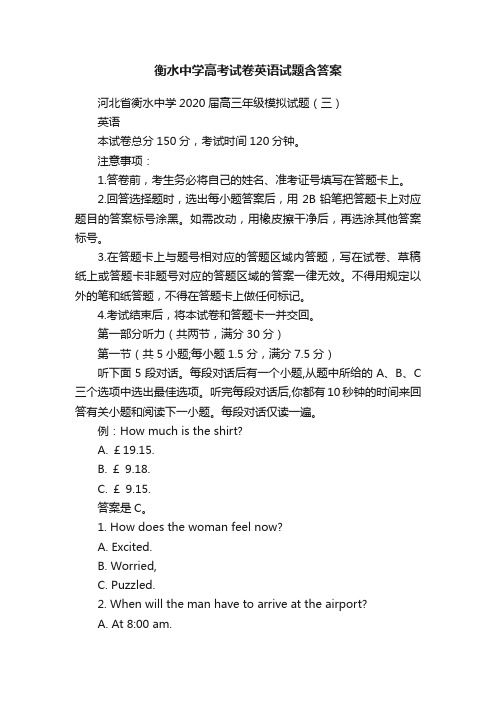
衡水中学高考试卷英语试题含答案河北省衡水中学2020届高三年级模拟试题(三)英语本试卷总分150分,考试时间120分钟。
注意事项:1.答卷前,考生务必将自己的姓名、准考证号填写在答题卡上。
2.回答选择题时,选出每小题答案后,用2B铅笔把答题卡上对应题目的答案标号涂黑。
如需改动,用橡皮擦干净后,再选涂其他答案标号。
3.在答题卡上与题号相对应的答题区域内答题,写在试卷、草稿纸上或答题卡非题号对应的答题区域的答案一律无效。
不得用规定以外的笔和纸答题,不得在答题卡上做任何标记。
4.考试结束后,将本试卷和答题卡一并交回。
第一部分听力(共两节,满分30分)第一节(共5小题;每小题1.5分,满分7.5分)听下面5段对话。
每段对话后有一个小题,从题中所给的A、B、C 三个选项中选出最佳选项。
听完每段对话后,你都有10秒钟的时间来回答有关小题和阅读下一小题。
每段对话仅读一遍。
例:How much is the shirt?A. £19.15.B. £ 9.18.C. £ 9.15.答案是C。
1. How does the woman feel now?A. Excited.B. Worried,C. Puzzled.2. When will the man have to arrive at the airport?A. At 8:00 am.B. At 9:00 am.C. At 9:30 am.3. What are the speakers probably doing?A. Doing a cleanup.B. Repairing the computer.C. Moving the furniture.4. What is the possible relationship between the speakers?A. Student and teacher.B. Husband and wife.C. Waiter and customer.5. What are the speakers talking about?A. The picture of the poster.B. The content of the instructions.C. The use of the pay phone.第二节(共15小题;每小题1.5分,满分22.5分)听下面5段对话或独白。
河北省衡水中学2020届高三英语试题(含答案)
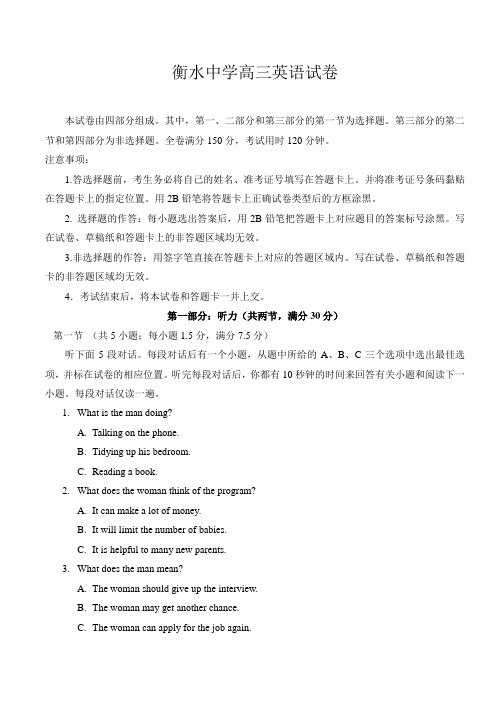
衡水中学高三英语试卷本试卷由四部分组成。
其中,第一、二部分和第三部分的第一节为选择题。
第三部分的第二节和第四部分为非选择题。
全卷满分150分,考试用时120分钟。
注意事项:1.答选择题前,考生务必将自己的姓名、准考证号填写在答题卡上。
并将准考证号条码黏贴在答题卡上的指定位置。
用2B铅笔将答题卡上正确试卷类型后的方框涂黑。
2. 选择题的作答:每小题选出答案后,用2B铅笔把答题卡上对应题目的答案标号涂黑。
写在试卷、草稿纸和答题卡上的非答题区域均无效。
3.非选择题的作答:用签字笔直接在答题卡上对应的答题区域内。
写在试卷、草稿纸和答题卡的非答题区域均无效。
4.考试结束后,将本试卷和答题卡一并上交。
第一部分:听力(共两节,满分30分)第一节(共5小题;每小题1.5分,满分7.5分)听下面5段对话。
每段对话后有一个小题,从题中所给的A、B、C三个选项中选出最佳选项,并标在试卷的相应位置。
听完每段对话后,你都有10秒钟的时间来回答有关小题和阅读下一小题。
每段对话仅读一遍。
1.What is the man doing?A.Talking on the phone.B.Tidying up his bedroom.C.Reading a book.2.What does the woman think of the program?A.It can make a lot of money.B.It will limit the number of babies.C.It is helpful to many new parents.3.What does the man mean?A.The woman should give up the interview.B.The woman may get another chance.C.The woman can apply for the job again.4.What does the woman ask the man to do?A.Clean the room.B.Wash the clothes.C.Clean the dishes.5.How many people are there in the woman’s family?A.Four.B.Five.C.Six.第二节(共15小题;每小题1.5分,满分22.5分)听下面5段对话或独白。
河北衡水中学2020届高三入学检测性考试英语试题 含答案
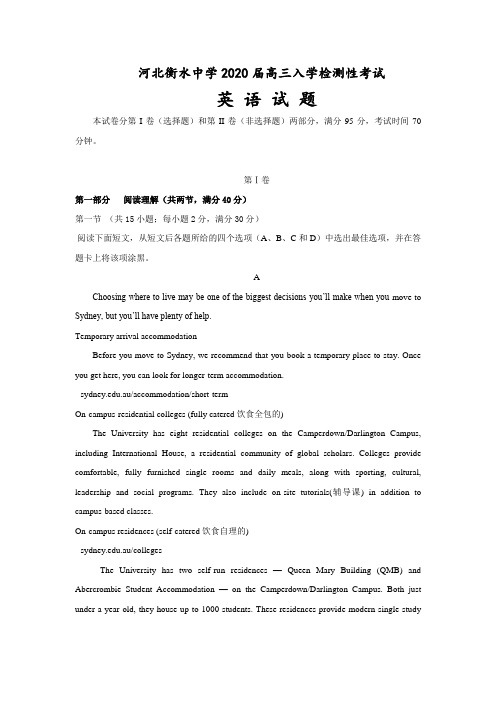
河北衡水中学2020届高三入学检测性考试英语试题本试卷分第I卷(选择题)和第II卷(非选择题)两部分,满分95分,考试时间70分钟。
第Ⅰ卷第一部分阅读理解(共两节,满分40分)第一节(共15小题;每小题2分,满分30分)阅读下面短文,从短文后各题所给的四个选项(A、B、C和D)中选出最佳选项,并在答题卡上将该项涂黑。
AChoosing where to live may be one of the biggest decisions you’ll make when you move to Sydney, but you’ll have plenty of help.Temporary arrival accommodationBefore you move to Sydney, we recommend that you book a temporary place to stay. Once you get here, you can look for longer-term accommodation..au/accommodation/short-termOn-campus-residential colleges (fully catered饮食全包的)The University has eight residential colleges on the Camperdown/Darlington Campus, including International House, a residential community of global scholars. Colleges provide comfortable, fully furnished single rooms and daily meals, along with sporting, cultural, leadership and social programs. They also include on-site tutorials(辅导课) in addition to campus-based classes.On-campus residences (self-catered饮食自理的).au/collegesThe University has two self-run residences —Queen Mary Building (QMB) and Abercrombie Student Accommodation —on the Camperdown/Darlington Campus. Both just under a year old, they house up to 1000 students. These residences provide modern single-studyrooms with large common living, learning and study spaces, shared kitchens, a theatre, gyms, soundproofed music rooms, art studios, sky lounges and rooftop gardens.au/campus-life/accommodation/live-on-campus.htmlOff-campus livingMore than 90 percent of our students live off campus. The University is close to many dynamic and multicultural suburbs such as Annandale, Newtown, Chippendale and Glebe. A great place to search is our large online database of properties..au/campus-life/accommodation/live-off-campus.html1.Where can you find a place to live temporarily?A. On “.au/colleges”.B. On “.au/accommodation/short-term”.C. On “.au/campus-life/accommodation/live-on-campus.html”.D. On “.au/campus-life/accommodation/live-off-campus.html”.2.What do students living in QMB have access to?A. Their own kitchens.B. On-site tutorials.C. Daily meals.D. Gyms.3.What is the most popular choice among students?A. Living off campus.B. Living in host families.C. Living in self-catered flats on campus.D. Living in fully catered houses on campus.BSince birth, Joy and Miriam were left at the gate of an orphanage (孤儿院). For the disabled sisters, who both have spina bifida (脊柱裂), it may have seemed that all hopes were lost at that time. But after being adopted by a British couple, they have become two of the country's most promising wheelchair basketball stars.In 2005, the Haizes adopted them. Then, they moved to the UK when Joy was six and Miriam was seven. The girls discovered the wheelchair basketball through a chance conversation, which Mr. Haize had with a friend in 2011. They hadn't known wheelchair sports before, but Joy was hooked from the beginning.While Miriam loved the sport, it took her a little longer to become a serious athlete. “I used to have really low self-respect,” she said. “It's only when Joy got into the Under 25s Europ ean Championships in 2013 that I started to take basketball seriously. It gave me a path to follow.” Miriam was then chosen to play at both regional trials and the Sainsbury's School Games in 2014. Of course, she earned herself a place at the famous GB Futures training camp. “GB Futures helped me a lot. It helped me take basketball to another level and learn more about the game and its history. It also helped me be more independent,” said Miriam. Meanwhile, Joy is currently the youngest player on the GB women's team — but she is making her mark on the international stage, having represented Great Britain in tournaments (锦标赛) all over the world.The teenagers are now eager to encourage others to explore the world of wheelchair sports. “You should have c onfidence in yourself. That's the one thing to help you succeed. Having setbacks helped me grow into a person and player. No matter what people said to us, we just tried our best,” said the girls.4.What happened to Joy and Miriam when they were born?A. They were adopted by a British couple.B. They were abandoned to an orphanage.C. They moved to the UK with their parents.D. They lived with parents in an orphanage.5.The sisters first got to know the wheelchair basketball from ________.A.GB Futures training campB. their P.E. teacher by chanceC. a conversation in a TV programD. a talk between their father and his friend6.It can be inferred from the passage that ________.A. the Haizes aimed to train Joy to become the world championB. Joy set a good example to Miriam in the wheelchair basketballC.it took Joy a long time to take the wheelchair basketball seriouslyD. Miriam is the youngest player on the women's basketball team7.What suggestion did the disabled sisters give to others?A. Put your heart into work!B.A good beginning is half done!C. All roads lead to Rome.D. Believe in yourself!CInternet time tied to teen depression(抑郁) symptomsSpending time online is normal behaviour for teenagers. But too much Internet use by teens —or too little, for that matter —might be related to depression, a new study finds.The findings, reported in the journal of Pediatrics, do not mean that the Internet is to blame. For one, teens in the study who spent no time online were also at increased risk of depression symptoms. Instead, the researchers say that both heavy Internet use, and non-use, could serve as signals that a teenager is having a hard time.For the study, Dr Pierre-Andre Michaud and his colleagues at the University of Lausanne, Switzerland, surveyed 7,200 individuals aged 16 to 20 about their Internet use.Those who were online more than two hours per day were considered “heavy” Internet users, while those online anywhere from several times per week to two hours per day were considered “regular” users.The teenagers also answered a number of health-related questions, including some standard questions about "depressive tendencies” that gauge(判定) how often a person feels sad or hopeless. Compared with regular Internet users, the study found, kids who were heavy users or non-users were more likely to be depressed or very depressed.Among male teens, heavy users and non-users were both around one-third more likely to have a high depression score, compared to “regular” users. Among girls, heavy Internet users had an 86 percent greater chance of depression, while non-users had a 46 percent greater likelihood compared to regular users.That was with factors like family income and any chronic health problems taken into account.Since teenagers typically go online to contact with friends, the researchers speculate(推测) that those who are never online may be more socially isolated.8.How long are those who are online per day considered “heavy” Internet users?A. More than two hours.B. More than eight hours.C. More than twelve hours.D. More than ten hours.9.What’s the purpose of Dr Michaud and his colleagues’ study?A. To know the actual number of teenagers online.B. To know the actual time of teenagers online.C. To know the influence of study online on teenagers.D. To know the relationship between the Internet use and depression.10.What’s the meaning of the underlined word “isolated” in the last paragraph?A. Independent.B. United.C. Separated.D. Capable.11.According to the accounts of the sixth paragraph, what can we conclude?A. Non-users of Internet aren’t likely to be depressed.B. Among girls, heavy Internet users are more likely to suffer depression than regular users.C. Heavy users will lead to death unless limited.D. Non-users have more possibility to be depressed than heavy users.DA study, conducted by David Evans of the World Bank and Anna Popova of Stanford University, looked at 19 programs around the world in which individuals were given cash transfers (汇款)from the government, either as a handout or as a “reward” for something like getting kids to school on time or taking them to the doctor for checkups.Evans and Popova looked at the impact those cash transfers had on the family budget and whether or not they led to an increase in spending on alcohol and cigarettes .What they found was that they almost always led to a reduction in a family’s alcohol and tobacco purchases.The news may surprise some people, b ut it’s true, and the researchers have several theories about why.One theory is that the cash transfer made things possible that once seemed impossible. Investing in their kids’ education or buying healthier and more expensive foods may be within rea ch now, but without the cash handout, these goals weren’t even a possibility. So families cut back on other expenses (like alcohol and tobacco) to make those dreams a reality.Another theory is that people just generally seem to do what they’re told. If they are given money and told to use it for their family’s welfare, in most cases, they will do just that. And that leads to the third theory: These cash transfers are usually given to women, and studies show that when women control the purse strings, more money is spent on taking care of their children.Whatever the reason for the trend, the data is clear—families that receive cash handouts don’t waste the money on booze and cigarettes as was previously thought. Instead, they typically use that mone y for the benefit of their families. And that’s money well spent.12.The study proves that .A. cash transfers help poor families get what would seem unavailable otherwiseB. cash should be given to poor people as a reward for something good for kidsC. given cash handouts, poor people would spend the money on alcohol and tobaccoD. poor people would save the cash given by the government for emergency needs13.A cash transfer led to a reduction in a family’s alcohol and tobacco purchases because.A. the education gained with the cash would help them drop alcohol and tobaccoB. the money previously for alcohol and tobacco would help realize their dreamC. buying healthier and more expensive foods left less money for alcohol and tobaccoD. that was the promise made before the cash transfer was given to the poor family14.In paragraph 5, when the author said “women control the purse strings”, he just meant “”.A. women are told what to doB.women are given the moneyC.women know what to do with the moneyD.women have the final word for money15.The passage mainly tells us .A.how the study was carried outB.why cash transfer is preferredC.the findings of a study and explanations to themD.the theories for a study about cash transfers第二节(共5小题,每小题2分,满分10分)根据短文内容,从短文后的选项中选出能填入空白处的最佳选项。
河北省衡水中学2020届高三仿真模拟五英语试题(原卷版)
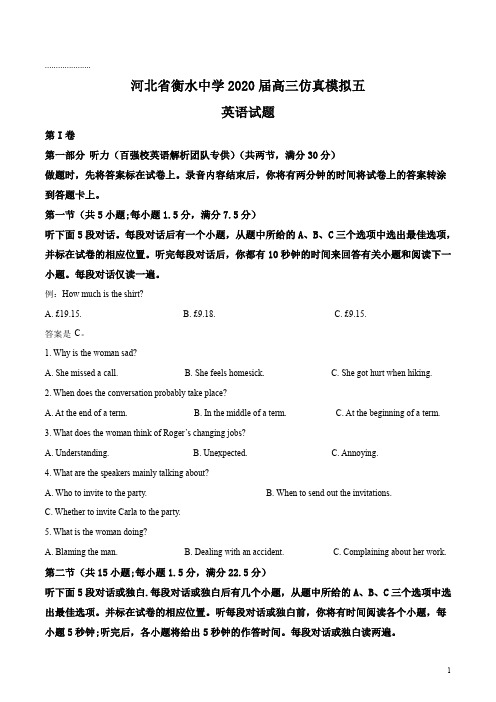
.....................河北省衡水中学2020届高三仿真模拟五英语试题第I卷第一部分听力(百强校英语解析团队专供)(共两节,满分30分)做题时,先将答案标在试卷上。
录音内容结朿后,你将有两分钟的时间将试卷上的答案转涂到答题卡上。
第一节(共5小题;每小题1.5分,满分7.5分)听下面5段对话。
每段对话后有一个小题,从题中所给的A、B、C三个选项中选出最佳选项,并标在试卷的相应位置。
听完每段对话后,你都有10秒钟的时间来回答有关小题和阅读下一小题。
每段对话仅读一遍。
例:How much is the shirt?A. £19.15.B. £9.18.C. £9.15.答案是C。
1. Why is the woman sad?A. She missed a call.B. She feels homesick.C. She got hurt when hiking.2. When does the conversation probably take place?A. At the end of a term.B. In the middle of a term.C. At the beginning of a term.3. What does the woman think of Roger’s changing jobs?A. Understanding.B. Unexpected.C. Annoying.4. What are the speakers mainly talking about?A. Who to invite to the party.B. When to send out the invitations.C. Whether to invite Carla to the party.5. What is the woman doing?A. Blaming the man.B. Dealing with an accident.C. Complaining about her work. 第二节(共15小题;每小题1.5分,满分22.5分)听下面5段对话或独白.每段对话或独白后有几个小题,从题中所给的A、B、C三个选项中选出最佳选项。
(衡水金卷调研卷)河北衡水中学2020年普通高等学校招生全国统一考试模拟试题英语三(解析版)
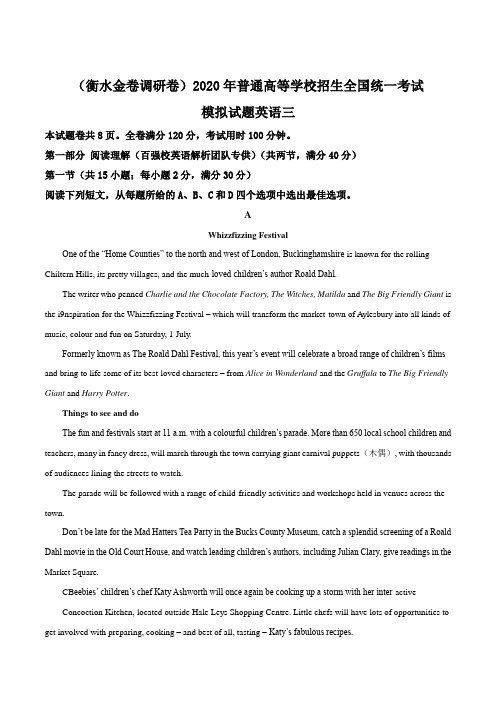
(衡水金卷调研卷)2020年普通高等学校招生全国统一考试模拟试题英语三本试题卷共8页。
全卷满分120分,考试用时100分钟。
第一部分阅读理解(百强校英语解析团队专供)(共两节,满分40分)第一节(共15小题;每小题2分,满分30分)阅读下列短文,从每题所给的A、B、C和D四个选项中选出最佳选项。
AWhizzfizzing FestivalOne of the “Home Counties” to the north and west of London, Buckinghamshire is known for the rolling Chiltern Hills, its pretty villages, and the much-loved children’s author Roald Dahl.The writer who penned Charlie and the Chocolate Factory, The Witches, Matilda and The Big Friendly Giant is the i9nspiration for the Whizzfizzing Festival – which will transform the market-town of Aylesbury into all kinds of music, colour and fun on Saturday, 1 July.Formerly known as The Roald Dahl Festival, this year’s event will celebrate a broad range of children’s films and bring to life some of its best-loved characters – from Alice in Wonderland and the Gruffala to The Big Friendly Giant and Harry Potter.Things to see and doThe fun and festivals start at 11 a.m. with a colourful children’s parade. More than 650 local school children and teachers, many in fancy dress, will march through the town carrying giant carnival puppets(木偶), with thousands of audiences lining the streets to watch.The parade will be followed with a range of child-friendly activities and workshops held in venues across the town.Don’t be late for the Mad Hatters Tea Party in the Bucks County Museum, catch a splendid screening of a Roald Dahl movie in the Old Court House, and watch leading children’s authors, including Julian Clary, give readings in the Market Square.CB eebies’ children’s chef Katy Ashworth will once again be cooking up a storm with her inter-activeConcoction Kitchen, located outside Hale Leys Shopping Centre. Little chefs will have lots of opportunities to get involved with preparing, cooking – and best of all, tasting –Katy’s fabulous recipes.With hands-on arts and crafts workshops, storytelling sessions, live music, a fancy dress competition, street theatre and more, there is something for everyone.For more information, visit: http://www.aylesburyvaledc . /cylesbury-whizzfizzing- festival-inspired- roald-dahl1. Who is Whizzfizzing Festival intended for?A. Children.B. Film stars.C. Publishers.D. Children’s authors.2. Which film was made from Roald Dahl’s work?A. Gruffalo.B. Harry Potter.C. Alice in Wonderland.D. The Big Friendly Giant.3. Which of the following best describes Whizzfizzing Festival?A. Varies.B. Global.C. Boring.D. Ordinary.4. What type of writing is this text?A. An exhibition guide.B. An art show review.C. An announcement.D. An official report.【答案】1. A 2. B 3. A 4. C【解析】本文是一篇说明文。
河北省衡水中学2020届高三英语试题(有答案)
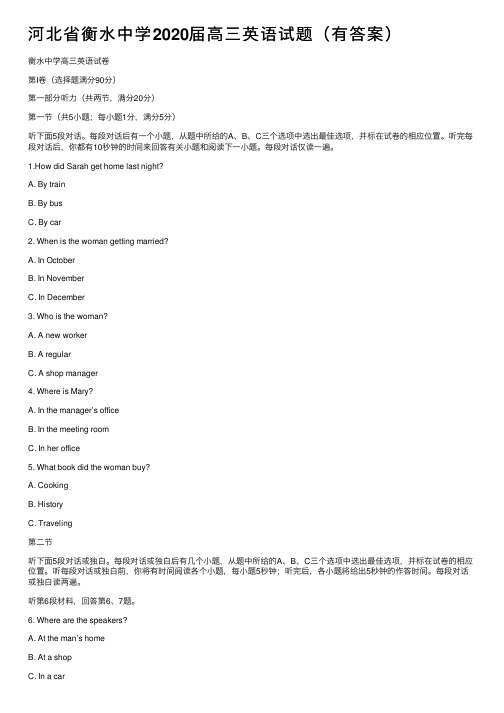
河北省衡⽔中学2020届⾼三英语试题(有答案)衡⽔中学⾼三英语试卷第I卷(选择题满分90分)第⼀部分听⼒(共两节,满分20分)第⼀节(共5⼩题;每⼩题1分,满分5分)听下⾯5段对话。
每段对话后有⼀个⼩题,从题中所给的A、B、C三个选项中选出最佳选项,并标在试卷的相应位置。
听完每段对话后,你都有10秒钟的时间来回答有关⼩题和阅读下⼀⼩题。
每段对话仅读⼀遍。
1.How did Sarah get home last night?A. By trainB. By busC. By car2. When is the woman getting married?A. In OctoberB. In NovemberC. In December3. Who is the woman?A. A new workerB. A regularC. A shop manager4. Where is Mary?A. In the manager’s officeB. In the meeting roomC. In her office5. What book did the woman buy?A. CookingB. HistoryC. Traveling第⼆节听下⾯5段对话或独⽩。
每段对话或独⽩后有⼏个⼩题,从题中所给的A、B、C三个选项中选出最佳选项,并标在试卷的相应位置。
听每段对话或独⽩前,你将有时间阅读各个⼩题,每⼩题5秒钟;听完后,各⼩题将给出5秒钟的作答时间。
每段对话或独⽩读两遍。
听第6段材料,回答第6、7题。
6. Where are the speakers?A. At the man’s homeB. At a shopC. In a car7. What has the woman forgotten to bring with her?A. Her bagB. Some moneyC. A map听第7段材料,回答第8、9题。
2020衡水中学高三五调英语试题及答案

2017—2018学年度上学期高三年级五调考试英语试卷本试卷分第I卷(选择题)和第Ⅱ卷(非选择题)两部分,共150分,考试时间120分钟。
第I卷(选择题共90分)第一部分听力(共两节,满分20分)第一节(共5小题;每小题1分,满分5分)听下面5段对话。
每段对话后有一个小题,从题中所给的A、B、C三个选项中选出最佳选项,并标在试卷的相应位置。
听完每段对话后,你都有10秒钟的时间来回答有关小题和阅读下一小题。
每段对话仅读一遍。
1.What does the man dislike about the play?A.The story.B.The ending.C.The actor.2.Which place are the speakers trying to find?A.A hotel.B.A hank.C.A restaurant.3.At what time will the two speakers meet?A.5:20.B.5:10.C.4:40.4.What will the man do?A.Change the plan.B.Wait for a phone call.C.Sort things out.5.What does the woman want to do?A.See a film with the man.B.Offer the man some help.C.Listen to some great music.第二节(共15小题;每小题1分,满分15分)听下面5段对话。
每段对话后有几个小题,从题中所给的A、B、C三个选项中选出最佳选项,并标在试卷的相应位置。
听每段对话前,你将有时间阅读各个小题,每小题5秒钟;听完后,各小题给出5秒钟的作答时间。
每段对话读两遍。
听第6段材料,回答第6、7题。
6.Where is Ben?A.In the kitchen.B.At schoo1.C.In the park.7.What will the children do in the afternoon?A.Help set the table. B.Have a party.C.Do their homework.听第7段材料,回答第8、9题。
河北省衡水中学2019-2020学年度第一学期高三调研考试英语试题
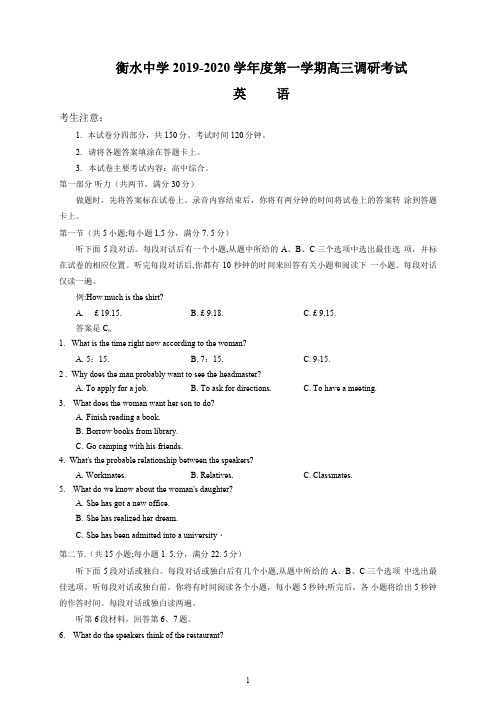
衡水中学2019-2020学年度第一学期高三调研考试英语考生注意:1. 本试卷分四部分,共150分。
考试时间120分钟。
2. 请将各题答案填涂在答题卡上。
3. 本试卷主要考试内容:高中综合。
第一部分听力(共两节,满分30分)做题时,先将答案标在试卷上。
录音内容结束后,你将有两分钟的时间将试卷上的答案转涂到答题卡上。
第一节(共5小题;每小题1.5分,满分7. 5分)听下面5段对话。
每段对话后有一个小题,从题中所给的A、B、C三个选项中选岀最佳选项,并标在试卷的相应位置。
听完每段对话后,你都有10秒钟的时间来回答有关小题和阅读下一小题。
每段对话仅读一遍。
例:How much is the shirt?A. £ 19.15.B. £ 9.18.C. £ 9.15.答案是C o1. What is the time right now according to the woman?A. 5:15.B. 7:15.C. 9?15.2 . Why does the man probably want to see the headmaster?A. To apply for a job.B. To ask for directions.C. To have a meeting.3. What does the woman want her son to do?A. Finish reading a book.B. Borrow books from library.C. Go camping with his friends.4. What's the probable relationship between the speakers?A. Workmates.B. Relatives.C. Classmates.5. What do we know about the woman's daughter?A. She has got a new office.B. She has realized her dream.C. She has been admitted into a university・第二节.(共15小题;每小题1. 5.分,满分22. 5分)听下面5段对话或独白。
- 1、下载文档前请自行甄别文档内容的完整性,平台不提供额外的编辑、内容补充、找答案等附加服务。
- 2、"仅部分预览"的文档,不可在线预览部分如存在完整性等问题,可反馈申请退款(可完整预览的文档不适用该条件!)。
- 3、如文档侵犯您的权益,请联系客服反馈,我们会尽快为您处理(人工客服工作时间:9:00-18:30)。
........................2019-2020学年度上学期高三年级五调考试英语试卷本试卷分第I卷(选择题)和第Ⅱ卷(非选择题)两部分,共150分,考试时间120分钟。
第I卷(选择题共90分)第一部分听力(共两节,满分20分)第一节(共5小题;每小题1分,满分5分)听下面5段对话。
每段对话后有一个小题,从题中所给的A、B、C三个选项中选出最佳选项,并标在试卷的相应位置。
听完每段对话后,你都有10秒钟的时间来回答有关小题和阅读下一小题。
每段对话仅读一遍。
1.What does the man dislike about the play?A.The story.B.The ending.C.The actor.2.Which place are the speakers trying to find?A.A hotel.B.A hank.C.A restaurant.3.At what time will the two speakers meet?A.5:20.B.5:10.C.4:40.4.What will the man do?A.Change the plan.B.Wait for a phone call.C.Sort things out.5.What does the woman want to do?A.See a film with the man.B.Offer the man some help.C.Listen to some great music.第二节(共15小题;每小题1分,满分15分)听下面5段对话。
每段对话后有几个小题,从题中所给的A、B、C三个选项中选出最佳选项,并标在试卷的相应位置。
听每段对话前,你将有时间阅读各个小题,每小题5秒钟;听完后,各小题给出5秒钟的作答时间。
每段对话读两遍。
听第6段材料,回答第6、7题。
6.Where is Ben?A.In the kitchen.B.At schoo1.C.In the park.7.What will the children do in the afternoon?A.Help set the table.B.Have a party.C.Do their homework.听第7段材料,回答第8、9题。
8.What are the two speakers talking about?A.A family holiday.B.A business trip.C.A travel plan.9.Where did Rachel go?A.To Spain.B.To Italy.C.To China.听第8段材料,回答第10至12题。
10.How does the woman get to know about third-hand smoke?A.From young smokers.B.From a newspaper article.C.From some smoking parents.11.Why does the man say that he should keep away from babies?A.He has just become a father.B.He wears dirty clothes.C.He is a smoker.12.What does the woman suggest smoking parents should do?A.Stop smoking altogether.B.Smoke only outside their houses.C.Reduce dangerous matter in cigarettes.听第9段材料,回答第13至16题。
13.Where does Michelle Ray come from?A.A middle-sized city.B.A small town.C.A big city.14.Which place would Michelle Ray take her visitors to for shopping?A.The Zen Garden.B.The Highlands.C.The Red River area.15.What does Michelle Ray do for complete quiet?A.Go camping.B.Study in a library.C.Read at home.16.What are the speakers talking about in general?A.Late-night shopping.B.Asian food.C.Louisville.听第10段材料,回答第17至20题。
17.Why do some people say they never have dreams according to Dr.Garfield?A.They forget about their dreams.B.They don’t want to tell the truth.C.They have no bad experiences.18.Why did Davis stop having dreams?A.He got a serious heart attack.B.He was too sad about his brother’s death.C.He was frightened by a terrible dream.19.What is Dr.Garfield’s opinion about dreaming?A.It is very useful.B.It makes things worse.C.It prevents the mind from working.20,Why do some people turn off their dreams completely?A.To sleep better.B.To recover from illnesses.C.To stay away from their problems.第二部分阅读理解(共两节,满分40分)第一节 (共15小题;每小题2分,满分30分)阅读下列短文,从每题所给的A、B、C和D四个选项中。
选出最佳选项。
APhiladelphia offers a ton of attractions that are suitable for people of every age and here are some family—friendly attractions.Spruce Street Harbor ParkSpruce Street Harbor Park, one of the best urban beaches in American, is an outdoor heaven on the Delaware River waterfront. Visitors can relax in a hammock, play on the playgrounds, and play games like table tennis and giant ch ess. Don’t miss out on the park at night, when colorful LED lights hanging from treetops make the entire areabright.Blue Cross RiverRinkOffering ice skating in the winter and roller skating in the summer, Blue Cross RiverRink creates a fun,outdoor experience for the whole family. Visitors can play on the nine-hole mini-golf course during the summer, and enjoy eats and drinks from the on-site (现场的) bar and restaurant all year round.Sesame PlaceBig Bird, Elmo and the other stars of Sesame Street come out and play at Sesame Place, the only theme park in the nation starring the popular TV show’s most lovable characters. A water park, interactive activities,parades, fireworks and shows add to the fun.Once Upon a Nation Storytelling BenchesOn summer days, u niformed and professional storytellers at 13 storytelling benches throughout Philadelphia’s Historic District entertain visitors with true, free, three-to-five minute tales about the colonial (殖民的)era as part of Once Upon a Nation . Children can pick up a Story Flag at any storytelling bench, and then collect a star from every storyteller on their journeys. Flags with all the stars can get free rides on the Parx Liberty Carousel at Franklin Square.1. Who would most probably go to Spruce Street Harbor Park?A. People who are fond of colorful treetops.B. People who want a relaxing day outdoors.C. People who have a preference for skating.D. People who are interested in water activities.2. Which place would fans of Big Bird be interested in?A. Sesame Place.B. Blue Cross RiverRink.C. The Parx Liberty Carousel.D. Spruce Street Harbor Park.3. What can we know about Philadelphia Storytelling Benches?A. It can be visited all year round.B. It has educational significance.C. It is available at a small charge.D. It is aimed at serving the public.4. What is the text aimed at?A. Telling what we can do in some places.B. Encouraging people to visit Philadelphia.C. Recommending some places for family fun.D. Comparing some attractions in Philadelphia.BMy mother died in August 2005. Eight months later, I began to come out of the fog of sadness and depression to find a new purpose for my life.Like many of my generation, I had lived only for myself —traveling, acquiring possessions, rising to a position of importance and seeking financial rewards. I was “charitable” and “volunteered” for various causes, but really didn’t give of myself.In the spring after my mom’s death, I found myself waking in the middle of the night with one thought. I felt forced to offer myself as a living kidney donor. My husband Robb had received the gift of life through a kidney transplant(移植)from a dead donor in 1999, so I was familiar with the enormous need for donors and knew several people who were waiting for a lifesaving transplant. I decided to offer myself to be matched with the most compatible(互不排斥的)person on the waiting list at my local transplant center.I was paired with 71-year-old Dee from New Jerse who had survived for six years on peritoneal dialysis(腹腔透析). At her 70th birthday, her family threw a big party as they did not expect her to live much longer. Dee has become my very good friend. Almost two years after the transplant, I was privileged to celebrate her 50th wedding anniversary with her husband, their five children and their extended family.In donating my kidney, I extended myself in a way far beyond what I ever believed was possible. I did so in honor of my mother who sacrificed so much for me and my sisters, and in memory of my husband’s donor who extended her 1ife through him.I encourage all who enjoy the gift of good health to share with others, either as a living donor or by appointing organ donation upon death. By extending yourself through organ donation, you will live on through others in an extraordinary way and give comfort to your loved ones.5. What does the underlined phrase “give of” mean?A. Relieve.B. DevoteC. AppreciateD. Forgive6. What can we infer from Paragraph 4?A. Dee was the author’s old friendB. The author attended Dee’s birthday partyC. Dee treated the author as a family memberD. The author’s donation made Dee live six years longer7. What would be the best title for this text?A. An old lady benefited from organ donationB. The memory of my beloved motherC. The deep meaning of loveD. Extend yourselfCOur modern working lives are ruled by the concept of competence.The idea that lies behind competence is quite simple:that one can state what people should do in behavioral terms,and then measure whether a person has succeeded in meeting that task or not.We rarely have a second thought about whether the idea of measuring and achieving competence is a good one or not.In fact,it is a controversial one.Humans do not learn or work in ways that can be measured by the concept of competence.Take the example of a barista(咖啡师)who is being trained to make coffee.The job title of“barista”suggests a degree of skill in making coffee.However,baristas in large coffee chains are usually trained through competence-based qualifications.One part of these qualifications is to produce a cup of coffee to meet a minimum standard.It might have to achieve a certain taste and appearance.This might seem perfectly reasonable,but there are two reasons why such an approach to training baristas does not work.First,the production of a cup of coffee to a certain standard is a binary(二次元的)outcome.The baristas can either produce a coffee of a certain standard or they cannot.If they happen to produce the best cup of coffee in the world,it does not matter,as competence-based training does not reward outstanding performance.Likewise,producing the worst cup of coffee would be a fail in the same way as producing a cup just below the standard.In fact,competence is not interested in the process of producing a coffee at all—only the final binary outcome.Second,if the barista does produce a coffee to a certain standard,competence is not interested in why the barista can do that.But humans are not machines that simply produce binary outcomes.We have bodies and minds which change through learning.Yet we are increasingly forced to achieve competence in our schools and workplaces.We are not empty machines that simply produce binary outcomes.If we want to be true human in our learning and our workplaces,we need to be creative and special.Learning and innovation(创新)involve failure in aiming forsomething that is unusually good.Such things simply cannot be judged by the standard of competence where the mediocre is the gold standard.8. Why is the approach to training baris tas unreasonable in the author’s eyes?A. It makes the outcomes rather unexpected.B. It encourages low standards in workplaces.C. It can’t improve baristas’motivation in work.D. It ignores the fact that humans are not machines.9. How does the author argue his main point?A. By giving an example and explaining.B. By criticizing the opposite point.C. By examining differences.D. By offering statistics.10. What does the underlined word“mediocre”in the last paragraph probably mean?A. Special skill.B. Great creativity.C. Average quality.D. Outstanding ability.11. What is probably the main purpose of the author in writing the text?A. To introduce new forms of learning and training.B. To explain how people learn and work nowadays.C. To state hu man beings’advantages over machines.D. To deny the general rule of measuring competence.DThey say the average person makes 35, 000 decisions a day. Yet in her new book, How Woman Decide, Therese Huston explores a widespread phenomenon that many women fa il to notice. “There’s a huge double standard when it comes to how men and women are viewed as decision makers, ”explains Therese, a psychologist from Seattle University. Therese decided to write the book after looking at her bookshelf: At one end, there were bestselling books about how to be a brilliant decision maker--all written by men and featuring interviews with men like athletes. At the other end were books aimed at women on gaining leadership skills and confidence.“Once those women are at the table, will their decisions be taken as seriously as men’s? ”Therese wondered. “Men are respected as decision makers more than women, especially in the workplace, largely because there’s thiscultural belief that women are unable to make smart choices at work.”So, Therese began to pick apart the stereotypes (固有印象) to see what scientific research had found. “Scientific research shows that men and women struggle with decision-making equally. The only disadvantage I found was that during the teenage years, teenage girls are more indecisive than teenage boys. Otherwise, there’s little difference between the genders.”However, there are some differences. “Women are more cooperative, ” says Therese, “A female boss is more likely to ask the opinions of those around her when making a choice. Women ask for input, which helps make better decisions. However, this is often seen as a weakness rather than a strength.”Therese also found that during times of stress, men and women make different choices, and the outcomes are often better when women are involved.Study after study backs this view up. Neuroscientists Mara Mather and Nicole Lighthall from the University of Southern California studied the way men and women make decisions and found that in times of stress, they react very differently.During their study, which involved playing a virtual gambling (赌博) game, they found that when the females became stressed, they made smart decisions-quitting while they were ahead or taking safe bets. But when the men became stressed, they did the opposite, risking everything for a slim chance of a big win.12. Why did Therese Huston write her book How Women Decide?A. Women are less respected as decision makers.B. Women are not equally treated in workplaces.C. Women are unable to make smart choices.D. Women are poor at making big decisions.13. What is women’s weakness in decision-making according to Therese Huston?A. Men can make quicker decisions than women.B. Women easily get stressed when making decisions.C. Women are likely to ask for input when making decisions.D. Teenage girls are 1ess able to make decisions than teenage boys.14. What can we infer from the last paragraph?A. Women show less confidence in times of stress.B. Men tend to make risky decisions in times of stress.C. Men demonstrate great bravery in times of stress.D. Women quit making decisions when ahead in games.15. What’s Therese’s final conclusion according to the text?A. Women are brilliant as decision makers.B. Men are weaker in making smart decisions.C. We should give up all cultural beliefs about gender.D. Great difference exists between the two genders in decision-making.第二节(共5小题;每小题2分,满分10分)根据短文内容,从短文后的选项中选出能填入空白处的最佳选项。
